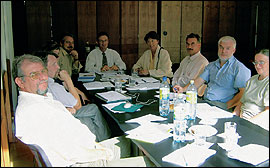 |
German-Hungarian Twinning Project successfully on its wayOne of the first of the EU-Phare 'Twinning' projects to focus on implementing the EU Water Framework Directive in Hungary came to a successful close at the end of 2004 with the help of German partners. |
 |
Experts from Germany,
Austria, the Netherlands
and the ICPDR supported
the Twinning Team in
Budapest with more than
400 days of input. |
Bringing together knowledge and support.
The German-Hungarian Twinning Project on the implementation of the EU Water
Framework Directive (WFD) started in Hungary in 2002. The project aimed
to assist the Hungarian environmental administration in the implementation
of the new European Water Protection policy in a timely manner. Originally
scheduled for only one year, the project was extended after encouraging
support from the Hungarian side as well as the EU Commission. Experts from
Germany, Austria, the Netherlands and the ICPDR supported the Twinning Team
located in Budapest with roundabout 400 days of input.
Building on practical experiences gathered from Member States and the results
of research projects dealing with technical issues of WFD implementation,
all agreed objectives could be reached effectively. "The international
experts of the Twinning Team managed to create a technically sound river
and lake typology within months, and compiled criteria lists for risk assessment
tailor-made for Hungarian requirements," says German project leader
Stephan von Keitz delegated from the Hessian Ministry for Environment. He
adds that "since gaps in the availability of biological data would
have bottlenecked the pressure and impact analysis of the more than 1,000
surface water bodies, project means have been allocated to collect scattered
information, for example in the field of biological data".
Successful cooperation.
The success of the project is clear. Hungarian project leader Zsuzsa Steindl
of the Ministry of Environment and Water believes that, "with the help
of the Twinning Project, the Hungarian WFD implementation approach is fully
in line with other Danubian upstream countries". She adds that as a
result of this cooperation, "Hungary is well prepared to hand in its
National Report to Brussels". The report constitutes a first major
milestone for all countries implementing the WFD. It is an ecological and
economical assessment of all the water bodies. It is due in March 2005.
For detailed results, presentations and project reports, see www.eu-wfd.info.
THE TWINNING PROJECT
Accession countries are assisted through several EU instruments, including
the PHARE programme. Originally designed for Poland and Hungary, but later
extended to other accession countries, the programme assists extensive
reorganisations with regard to society, economy and the political
systems and highlights the necessity of a sound preparation of the accession
countries. Within the PHARE programme, 'Twinning' projects have been conducted
in order to build close partnerships between administrations of comparable
competencies between Member States and Accession Countries.
The twinning process provides countries with the technical and administrative
knowledge they need to implement the legislative and regulatory
texts already passed and applied by the 15 current Member States. Cooperation
methods include long-term and full-time secondment of civil servants, called
Pre-Accession Advisors, from Member States to the candidate countries, as
well as shorter assignments carried out by specialists in each Directive
in the countries concerned.
For information on specific programmes, please visit: www.oieau.fr/anglais/international/twinning.htm